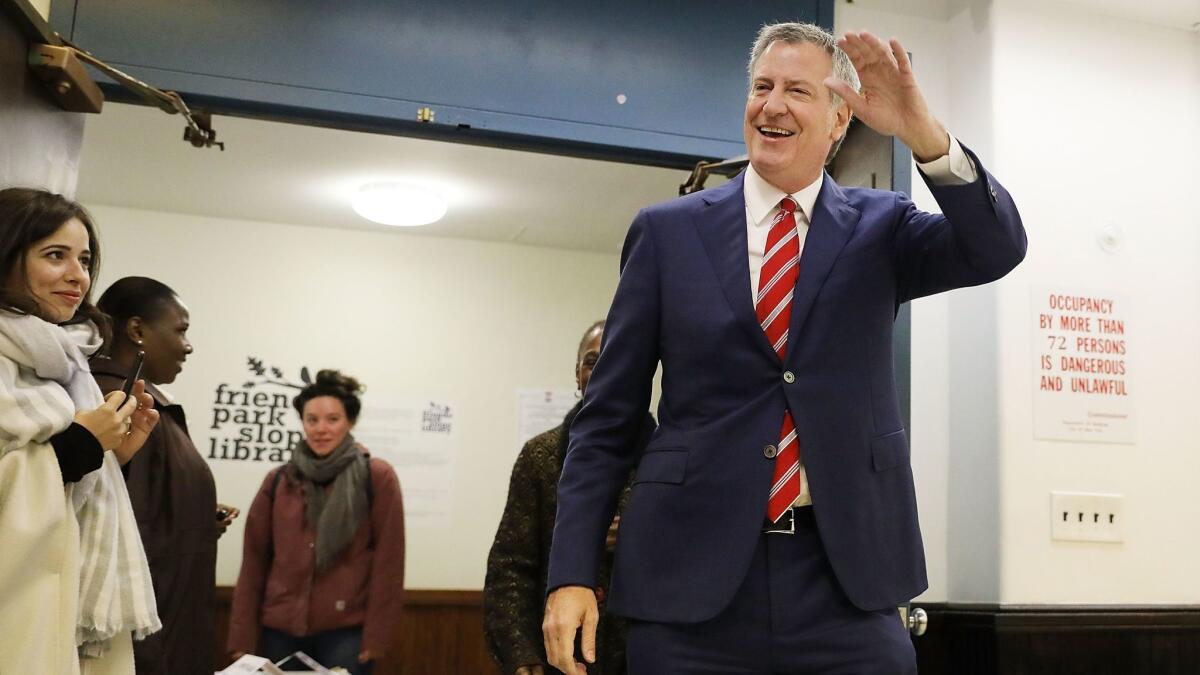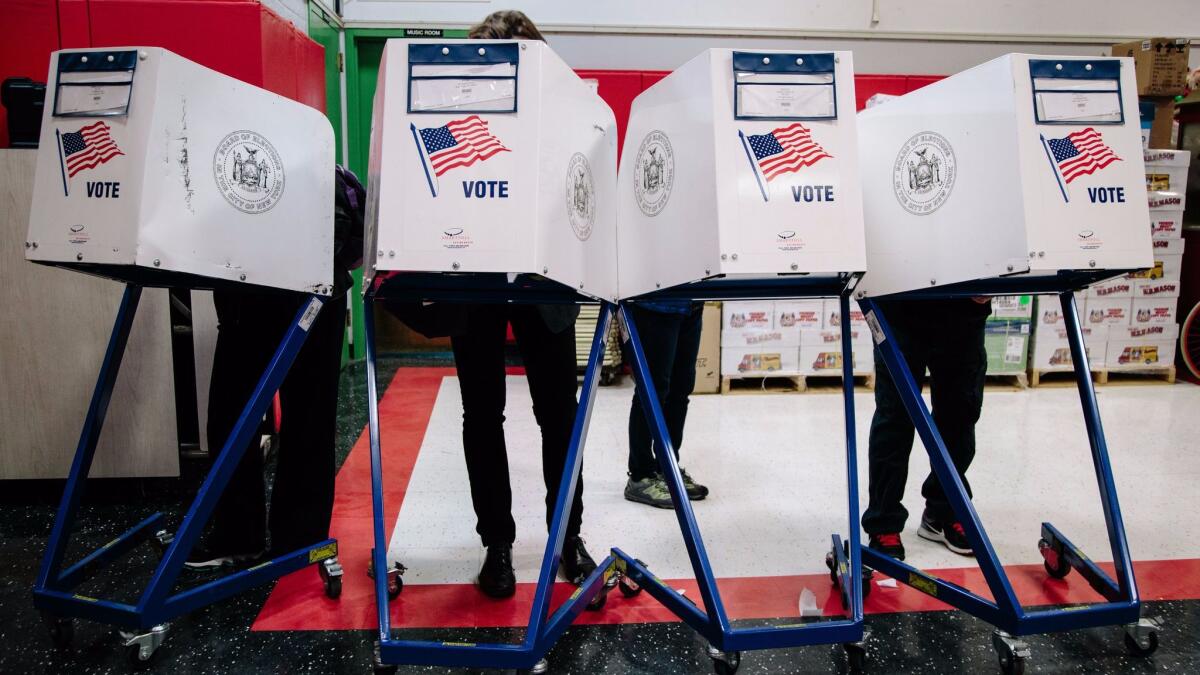It may be Trumpâs hometown, but itâs De Blasioâs city â and will be for the next four years

Reporting from New York â He is the anti-Trump, a self-styled progressive who is mayor of the presidentâs hometown and a prominent voice in the Democratic resistance to the White House.
Despite misgivings by many New Yorkers who complain the mayor can be out of touch with their daily concerns, Bill de Blasio on Tuesday handily won a second term in office leading the nationâs largest city, a perch from which he can remain a thorn in the side of the cityâs most prominent native son, President Trump.
There is even talk that de Blasio, along with his fellow big-city mayor, Eric Garcetti of Los Angeles, might be a prospective presidential candidate himself.
âI think he wants to go national,â said George Arzt, a former aide to New York Mayor Ed Koch and a longtime political consultant.
Voters head to the polls to decide races that could set strategies for the 2018 elections Âť
Since Trump was elected a year ago, de Blasio has made no secret of his opposition to the president and his policies, announcing his support for women in the face of a proposal to defund Planned Parenthood, defiance of the presidentâs order to cut federal funding to so-called sanctuary cities and a steadfast commitment to immigrants.
Just one day before the election, in remarks at a meeting of a local economic development organization, de Blasio again took aim at Trump, criticizing his tax plan as being harmful to the city.

âThe danger to New York City isnât here â itâs 200 miles down I-95,â he said, referring to the freeway that runs the length of the East Coast.
De Blasio also repeatedly cited his anti-Trump stance during his reelection campaign against Republican Nicole Malliotakis and independent Bo Dietl, tarring them as being too close to the president, who is extremely unpopular in his home city.
âMy two opponents are right-wing Republicans who voted for Donald Trump,â de Blasio said during a debate last month.
A 6-foot-5 Boston Red Sox fan, de Blasio is not especially well-loved himself, despite the political support.
Like Trump, he has a reputation for being a bit of a snob. He is late for meetings. He takes chauffeured rides on workdays to a Brooklyn gym. Perhaps worst of all, he shares a Trump trait that is the New York equivalent of wearing a bow tie to a bowling alley: He eats pizza with a knife and fork.
âItâs just blasphemous,â said Corey Hoffmann, a 28-year-old originally from New Jersey.
âBut it wouldnât stop me from voting for him,â Hoffmann added, noting that he voted for de Blasio in 2013 and again on Tuesday.
Poor people are getting pushed out â they canât afford the rent. He has to do more.
— Erwin Edwards, a retired New York City bus driver
The mayor was elected to his first term on campaign promises to curtail police officersâ use of stop-and-frisk, which critics argued was tantamount to racial profiling, and to increase affordable housing following years of luxury development and soaring housing prices under his predecessor, Michael R. Bloomberg.
He delivered on both, settling a constitutional lawsuit over the policing practice and adding close to 80,000 affordable housing units â something he has vowed to continue in a second term.
His signature achievement was to extend public pre-kindergarten to all eligible children â a program he now aims to extend to early childhood education for 3-year-olds.
But the mayorâs tenure was also characterized by memorable moments of discord, including funerals where police officers turned their backs on him in a show of protest and open spats with New York Gov. Andrew Cuomo, who opposed the âmillionaireâs taxâ de Blasio wanted to pay for the pre-K program.
De Blasio and several aides were also investigated by federal prosecutors for exchanging favorable city action for campaign donations.
The timing of that investigation may have influenced potential Democratic challengersâ ability to mount an effective campaign against him, political observers said.
âI think everyone was waiting ... to see if he would be charged criminally or any of his top people would be charged criminally, and they werenât,â Arzt said. âSo no one ran.â
Malliotakis, his closest opponent, is a Republican state Assembly member from Staten Island. Shortly after Trump was elected she sued the de Blasio administration over its policy of destroying personal records associated with its municipal ID program, which is used by many immigrants who donât have other forms of government identification. The suit was seen as supporting Trumpâs planned crackdown on immigrants.
With roughly three-quarters of precincts reporting, de Blasio had 64% of the vote, with Malliotakis hovering just under 30%.
At a polling station in the Crown Heights neighborhood of Brooklyn, local issues dominated in votersâ minds more than Trump did. The neighborhood, historically home to a large Caribbean population, is one of a few in the outer boroughs that has seen rapid change and a dramatic increase in rents in the last four years.
âPoor people are getting pushed out â they canât afford the rent,â said Erwin Edwards, who bought his house in Bedford-Stuyvesant, another rapidly gentrifying neighborhood, in 1998. âHe has to do more.â
Edwards, a retired city bus driver, said he was glad the mayor reined in the police. More directly relevant to him, he said, de Blasio did a good job of plowing the streets in outer boroughs after major snow storms â something Bloomberg did not.
âWhen Bloomberg was mayor, youâd be slipping and sliding out there,â Edwards said, gesturing at the streets.
On other transit issues, though, voters said de Blasio needed to do more.
Subway crowding, delays and derailments have become a major headache for New Yorkers in recent years, with de Blasio and Cuomo openly fighting over who is to blame. This year de Blasio issued a list of priorities for subway improvements but said the city shouldnât have to pay a dime.
âThe power play between the two of them is impacting [services],â said Earl Phillips, secretary-treasurer of Transport Workers Union Local 100, which represents transit workers in the city. âThe subways are a mess. The bulk of the operation and of the real estate are in the cityâŚ. Heâs not putting his fair share of funding in.â
Despite those criticisms, voters shared one dominant sentiment: Bill de Blasio, the only progressive on the ballot, was better than the rest.
On Tuesday, it seemed, that was good enough.
ALSO
One year later, Democrats try to use painful lessons of 2016 to guide future campaigns
Uzbek community in New York wary of being tied to Islamic extremism
New York, defiant after terrorist attack, takes to the streets for the annual marathon
Twitter: @AgrawalNina
UPDATES:
6:35 p.m.: The story was updated with de Blasioâs victory.
The story was originally published at 5:40 p.m.
More to Read
Sign up for Essential California
The most important California stories and recommendations in your inbox every morning.
You may occasionally receive promotional content from the Los Angeles Times.











